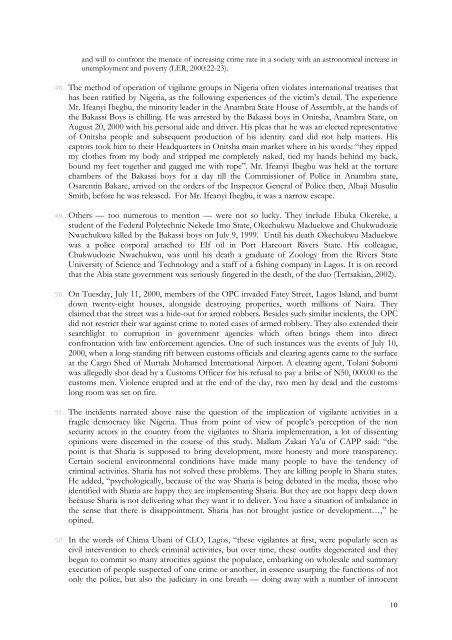114 - Nigeria - Crime and Human Rights Shettima, Kole - The ICHRP
114 - Nigeria - Crime and Human Rights Shettima, Kole - The ICHRP
114 - Nigeria - Crime and Human Rights Shettima, Kole - The ICHRP
You also want an ePaper? Increase the reach of your titles
YUMPU automatically turns print PDFs into web optimized ePapers that Google loves.
<strong>and</strong> will to confront the menace of increasing crime rate in a society with an astronomical increase in<br />
unemployment <strong>and</strong> poverty (LER, 2000:22-23).<br />
48. <strong>The</strong> method of operation of vigilante groups in <strong>Nigeria</strong> often violates international treatises that<br />
has been ratified by <strong>Nigeria</strong>, as the following experiences of the victim’s detail. <strong>The</strong> experience<br />
Mr. Ifeanyi Ibegbu, the minority leader in the Anambra State House of Assembly, at the h<strong>and</strong>s of<br />
the Bakassi Boys is chilling. He was arrested by the Bakassi boys in Onitsha, Anambra State, on<br />
August 20, 2000 with his personal aide <strong>and</strong> driver. His pleas that he was an elected representative<br />
of Onitsha people <strong>and</strong> subsequent production of his identity card did not help matters. His<br />
captors took him to their Headquarters in Onitsha main market where in his words: “they ripped<br />
my clothes from my body <strong>and</strong> stripped me completely naked, tied my h<strong>and</strong>s behind my back,<br />
bound my feet together <strong>and</strong> gagged me with rope”. Mr. Ifeanyi Ibegbu was held at the torture<br />
chambers of the Bakassi boys for a day till the Commissioner of Police in Anambra state,<br />
Osarentin Bakare, arrived on the orders of the Inspector General of Police then, Alhaji Musuliu<br />
Smith, before he was released. For Mr. Ifeanyi Ibegbu, it was a narrow escape.<br />
49. Others — too numerous to mention — were not so lucky. <strong>The</strong>y include Ebuka Okereke, a<br />
student of the Federal Polytechnic Nekede Imo State, Okechukwu Maduekwe <strong>and</strong> Chukwudozie<br />
Nwachukwu killed by the Bakassi boys on July 9, 1999. Until his death Okechukwu Maduekwe<br />
was a police corporal attached to Elf oil in Port Harcourt Rivers State. His colleague,<br />
Chukwudozie Nwachukwu, was until his death a graduate of Zoology from the Rivers State<br />
University of Science <strong>and</strong> Technology <strong>and</strong> a staff of a fishing company in Lagos. It is on record<br />
that the Abia state government was seriously fingered in the death, of the duo (Tertsakian, 2002).<br />
50. On Tuesday, July 11, 2000, members of the OPC invaded Fatey Street, Lagos Isl<strong>and</strong>, <strong>and</strong> burnt<br />
down twenty-eight houses, alongside destroying properties, worth millions of Naira. <strong>The</strong>y<br />
claimed that the street was a hide-out for armed robbers. Besides such similar incidents, the OPC<br />
did not restrict their war against crime to noted cases of armed robbery. <strong>The</strong>y also extended their<br />
searchlight to corruption in government agencies which often brings them into direct<br />
confrontation with law enforcement agencies. One of such instances was the events of July 10,<br />
2000, when a long-st<strong>and</strong>ing rift between customs officials <strong>and</strong> clearing agents came to the surface<br />
at the Cargo Shed of Murtala Mohamed International Airport. A clearing agent, Tolani Subomi<br />
was allegedly shot dead by a Customs Officer for his refusal to pay a bribe of N50, 000.00 to the<br />
customs men. Violence erupted <strong>and</strong> at the end of the day, two men lay dead <strong>and</strong> the customs<br />
long room was set on fire.<br />
51. <strong>The</strong> incidents narrated above raise the question of the implication of vigilante activities in a<br />
fragile democracy like <strong>Nigeria</strong>. Thus from point of view of people’s perception of the non<br />
security actors in the country from the vigilantes to Sharia implementation, a lot of dissenting<br />
opinions were discerned in the course of this study. Mallam Zakari Ya’u of CAPP said: “the<br />
point is that Sharia is supposed to bring development, more honesty <strong>and</strong> more transparency.<br />
Certain societal environmental conditions have made many people to have the tendency of<br />
criminal activities. Sharia has not solved these problems. <strong>The</strong>y are killing people in Sharia states.<br />
He added, “psychologically, because of the way Sharia is being debated in the media, those who<br />
identified with Sharia are happy they are implementing Sharia. But they are not happy deep down<br />
because Sharia is not delivering what they want it to deliver. You have a situation of imbalance in<br />
the sense that there is disappointment. Sharia has not brought justice or development…,” he<br />
opined.<br />
52. In the words of Chima Ubani of CLO, Lagos, “these vigilantes at first, were popularly seen as<br />
civil intervention to check criminal activities, but over time, these outfits degenerated <strong>and</strong> they<br />
began to commit so many atrocities against the populace, embarking on wholesale <strong>and</strong> summary<br />
execution of people suspected of one crime or another, in essence usurping the functions of not<br />
only the police, but also the judiciary in one breath — doing away with a number of innocent<br />
10
















